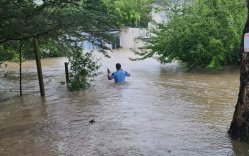Volunteers shone during dark days of 2023 floods

It has been a year since floods devastated Auckland (followed just weeks later by Cyclone Gabrielle).
27 January 2023 started out as an ordinary Friday. People went to work, went about their daily lives, and enjoyed the last of the school holidays. Tens of thousands were looking forward to that night’s Elton John concert at Mt Smart Stadium. No-one foresaw what was to unfold over the next hours and days.
By mid-afternoon it was raining steadily, but Auckland’s used to rain. Over the next hours, however, the rain became a deluge unlike anything we’d seen before. More than 150mm of rain fell in just three hours in some parts of Auckland, and over four days we had more rain than we would usually have in six months.
As the record-breaking rain poured down, social media feeds quickly filled up with astonishing photos and videos from around the city.
There were scenes of cars and buses being floated across intersections by the floodwaters. Of people standing on bus seats as buses carefully made their way through flooded sections of the Northern Expressway. Supermarkets waist-deep in water. People wading through waist-high or even chest-high water as they evacuated their homes. There was chaos on the roads as people tried to find a safe way to get home from wherever they had been (including many thousands who had optimistically gone to the Elton John concert, which was not cancelled until very late). Landslips began to wash out roads, wipe out water and sewer pipes, and de-stabilise homes.
By this time, mainstream media was also full of reports from around the city. Auckland Council’s civil defence arm, Auckland Emergency Management (AEM), had swung into action. In the year since then, there has been much criticism of the Council and AEM response – and a number of areas highlighted where lessons needed to be learned and improvements made. But we don’t intend to delve into those here.
Instead – we pay tribute to the thousands of volunteers who stepped forward to help. We acknowledge and applaud these wonderful people who simply turned up to do whatever they could.
The people who checked on their neighbours and helped them where needed. The people who opened their homes to others who’d suddenly become homeless. The people who donated clothes, food, appliances, and furniture to people who had lost everything in the floods. To those who turned up at donation centres to help sort and distribute donated food and goods. The community groups who gathered to help their neighbourhoods. The marae, churches, and temples of various faiths who offered refuge, and cooked thousands of meals for those who needed them. To those who helped people in their community to remove flood-soaked furnishings, carpets and belongings out of their homes. Who helped dig and sweep the worst of the silt out of neighbour’s homes.
At Volunteering Auckland, we set up a page on our website where organisations across Auckland were able to publicise what services and support they were able to offer. Some threw open their doors to those who needed a place to stay. Some served meals, others had food banks, clothing, furnishings, and appliances. Others provided clean-up assistance. We were humbled by speed and generosity of their response, and the amazing ways in which they supported strangers in need of help.
The outpouring of community spirit and human kindness was the one bright thing in dark times, when thousands of Aucklanders found themselves facing uncertain times, with homes that were now unliveable.
He aha te mea nui? Māku e kii atu, he tāngata, he tāngata, he tāngata.
What is the most important thing in the world? Well, let me tell you, it is people, it is people, it is people.
More than 7000 homes were deemed uninhabitable in the aftermath of the floods, and the cyclone that followed shortly afterwards. Some were yellow-stickered as needing repair, some were red-stickered as being unsafe to even re-enter to retrieve possessions. While many homes have since been repaired and re-occupied, more than 1,000 still lie empty as owners work through the tangle of insurance, assessments, and official processes – and await answers. More than 90 properties have been bought by council as part of a $2 billion rescue package – and it’s estimated that around a further 500 will also be bought. Others may be able to rebuild on their properties, if they wish to.
During the year, many volunteers have continued to help where they can. The immediate needs of food, clothes, shelter, and the immediate clean-up, have passed. But many organisations and individuals have stepped up in different ways to assist with the longer-term needs of people affected.
For some of you, volunteering was already a part of your daily lives. For others, it may have been a new experience.
For all who may be interested in finding meaningful ways to continue volunteering – whether it’s casual things you can do as and when you have time, or a regular commitment – please check the many and varied volunteering opportunities on the Volunteering Auckland website.
Volunteers often simply get on with what they do, without wishing for any fanfare or public praise – so the work volunteers do can so often be unseen and under-appreciated (or just taken for granted).
So – to all of you who helped during the floods, in the immediate aftermath, and in the year since then – our thanks and gratitude. Sometimes, you have given your help to a someone you know – perhaps a neighbour. For others, the help you’ve given has been to strangers. The people you helped may not know who you are, or been able to thank you, but we have heard many stories of the kindness of strangers – and can pass on how grateful they were for everything that you did.
We want to take this time to acknowledge everything that you have done. To tell you that we see what you’ve done, and what you continue to do – and understand the incredible impact you’ve had on the lives of those in need.
Ngā mihi nui
Volunteering Auckland

